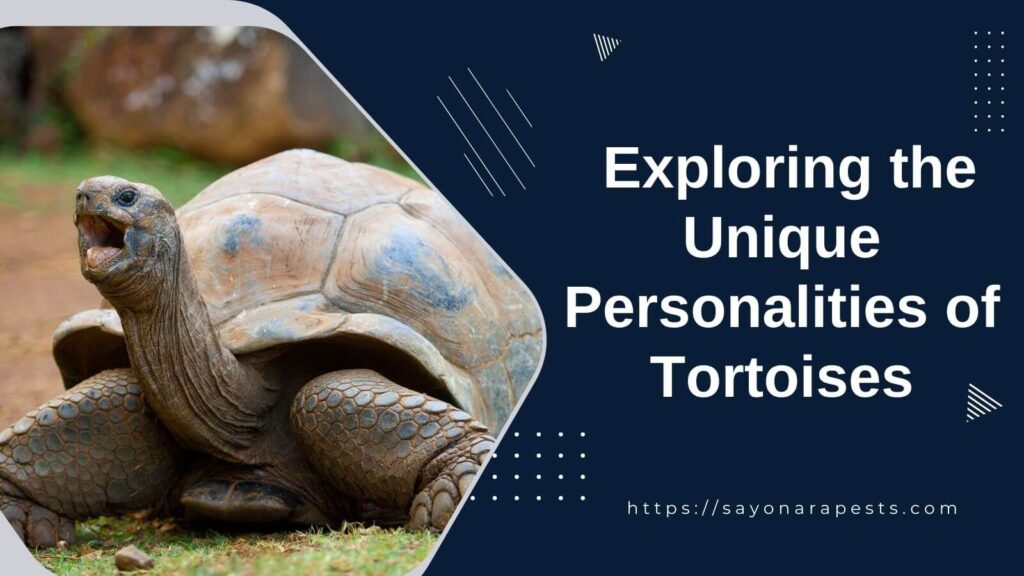In the fascinating world of wildlife, where animals of all shapes and sizes live, there is a place that demands our attention: a mysterious place where tough, interesting tortoises live.
Scientists, naturalists, and animal lovers have been interested in these ancient reptiles for a long time because of their armored shells and careful movements.
Even though it may be easy to think of these slow, deliberate creatures as simple, more and more people are realizing that behind their calm exteriors is a complex web of different personalities waiting to be discovered.
Studying tortoise personalities is more than just interesting; it helps us learn more about their behavior, well-being, and how to protect them.
By learning about the complexities of their personalities, we set out on a fascinating journey of discovery that shows us the wonders of the animal kingdom.
The goal of this article is to look into the unknown parts of tortoise personalities and find the secrets that lie beneath their tough shells. We will go on a very interesting trip because we want to find out what makes each tortoise unique, with its own habits and tastes.
By putting the spotlight on these amazing animals, we hope to make people more aware of their existence and help the ongoing efforts to protect their habitats and make sure they are healthy.
As we start this awe-inspiring look at the world of tortoise personalities, you can expect to hear stories of perseverance, adaptability, and surprises.
The Basic Characteristics of Tortoise Personalities
General Overview of Tortoise Personalities
Tortoises have a very old and serious look, but they also have a lot of interesting and unique traits. These amazing reptiles are known for their calm demeanor, which they often show by staying still.
Their slow and deliberate movements show that they take life slowly and carefully. Tortoises are known to be very patient animals that can wait for hours or even days for the right time to act.
They also have a natural ability to adapt to different environments and conditions, which helps them live and do well in many different places around the world.
Factors Affecting Tortoise Personalities
A tortoise’s unique personality is made up of many different parts. One of these factors is their species and their genetic makeup. Different kinds of tortoises have different habits that make up their personalities.
For example, the Galapagos tortoise, which is known for being hardy and living a long time, tends to be more laid-back and tolerant than other species. A tortoise’s upbringing and early experiences can also have a big effect on how they turn out.
The availability of resources, social interactions, and exposure to different stimuli all have a big impact on a tortoise’s personality. When all of these things come together, they make a complicated web of influences that shape the different personality traits of each tortoise.
The Importance of Individuality
When it comes to tortoise personalities, individuality is very important. Each tortoise has its own personality, habits, and likes and dislikes that set it apart from the others.
This uniqueness not only makes the tortoise population more interesting and varied, but it also helps them stay alive and adapt. Tortoises can be unique because they can explore and take advantage of different ecological niches.
This lets the species do well in a wide range of habitats. Also, each tortoise has its own personality, which affects its overall health and quality of life.
By noticing and appreciating how different tortoises are, we can learn more about them and feel more connected to them. This will help us feel empathy and respect for their different needs and preferences.
Tortoises have a wide range of interesting traits and behaviors that make up their basic personalities. Their overall appearance shows that they are calm, patient, and able to change.
Their personalities are shaped in large part by their species, their genes, and their environments. Recognizing the importance of individuality in a population of tortoises shows how important it is for their survival and well-being.
By digging deeper into the complicated world of tortoise personalities, we can learn more about these beautiful animals and the intricate web of their behaviors.
The Different Types of Tortoise Personalities
Tortoises are fascinating animals that belong to the reptile world. They have many different personalities that fascinate both fans and scientists.
These gentle animals, which are known for moving slowly and deliberately, are not only defined by their bodies but also by their unique personalities. Knowing how different types of tortoises act, how to care for them, and how well they are doing can be very helpful.
Shy Tortoises
Shy tortoises are the introverts of the tortoise world. They usually like to be alone and in quiet places.
These people tend to go back into their shells at the first sign of trouble or something new. Tortoises that are shy act cautiously, and it may take them longer to get used to new places or people.
Their shyness makes them more prone to stress, so giving them a calm, safe place to live is important for their health and happiness.
Curious Tortoises
Tortoises are different from other animals because they are naturally curious. These people actively look around them and are interested in new things and experiences.
They may be very interested in new things and often stretch their necks and heads to look at them. This can lead them to try out new things and learn more about their surroundings, which is good for their minds and the world around them.
But it’s important to make sure that their adventures don’t put them at risk of getting hurt or being exposed to things that are bad for them.
Aggressive Tortoises
Some tortoises are more aggressive than the gentle nature most people think of when they think of tortoises. When they feel threatened, territorial tortoises act aggressively to protect their space and resources.
This can come out in the form of biting, ramming, or hissing. It is important to find out why these tortoises are being aggressive, which could be due to bad housing, stress, or a lack of socialization.
Professional help and careful management are needed to deal with and change aggressive behaviors. This keeps the tortoise and the people who care for it safe.
Sociable Tortoises
Tortoises that are social have a special tendency to get along with other tortoises and with people. These people like to be around other people and do things like come up to and follow people or have gentle conversations with other tortoises.
Socializing with other tortoises can be good for their minds, and interacting with people can help create a bond and strengthen the relationship between the tortoise and the person.
But it’s important to keep in mind that even social tortoises need a lot of time to rest and be alone for their overall health.
Solitary Tortoises
Tortoises that live alone like the peace and quiet of being by themselves, and they often do well when they have a quiet, large space to live in. These people may be more independent and prefer to be alone instead of looking for social interactions.
Solitary tortoises may not be as interested in exploring their surroundings, and if their personal space is invaded, they may act aggressively. It is important to treat solitary tortoises with respect and give them a good environment, giving them chances to exercise and keep their minds active while also letting them be alone when they want to.
Understanding the different personalities of tortoises is important for giving them the right care and making sure they stay healthy.
Tortoise owners and fans can help these ancient animals live in peace and happiness by making sure their environments and interactions fit their unique personalities.
Each type of tortoise personality, like shy, curious, aggressive, social, or solitary, adds to the rich tapestry of these interesting animals and reminds us of the variety and wonder of the animal kingdom.
Understanding Shy Tortoises
Causes of Shyness
Tortoises can be shy for a number of reasons, and it’s important to know what those reasons are if you want to care for and interact with them well. One of the main reasons tortoises are shy is that they are prey animals by nature.
Over many years, tortoises have learned to be careful and wary of possible dangers in their environment. Their instinct to live tells them to go back into their shells and stay out of harm’s way.
Shyness can also be made worse by traumatic events like having one’s habitat destroyed, being mistreated, or being exposed to loud noises or sudden movements.
These things can change a tortoise’s behavior in the long run, making it more shy and less likely to interact with people or its surroundings.
Characteristics of Shy Tortoises
Tortoises that are shy often have unique traits that help us understand and relate to their shyness. Most of the time, these tortoises like to be alone and seek privacy in their enclosures or in the wild.
They may hide in their shells at the slightest sign of danger, avoiding eye contact and staying still for long periods of time. Shy tortoises are also more aware of their surroundings than other tortoises, and they react quickly to sudden movements or things that are new to them.
Also, they may be more careful when they eat, showing hesitation or reluctance to try out new food sources.
How to Approach Shy Tortoises
To get close to shy tortoises, you need to be patient, and gentle, and respect their space. It is important to make a place that people can trust and feel comfortable in.
Start by giving them a safe, large enclosure that looks like their natural habitat, with places to hide and a temperature that stays the same. If you want to get close to a shy tortoise, move slowly and don’t make any sudden movements or loud noises that might scare it.
Keep your cool and give them the chance to watch you from a safe distance. Over time, get closer and closer to the tortoise while making sure it feels safe.
It’s important to go at the tortoise’s pace and let them come to you when they want to. This slow method builds trust and makes the tortoise feel more comfortable.
Tips for Caring for Shy Tortoises
Caring for shy tortoises means taking certain steps to make sure they are healthy and help them get over being shy. It is very important to give them a good home with places to hide, different temperatures, and a balanced diet.
Tortoises that are shy may need more places to hide, like plant cover or artificial shelters, where they can go when they feel too much. Stress can also be reduced by keeping a consistent daily routine and limiting sudden changes in their environment.
Important parts of caring for them are giving them a variety of healthy foods on a regular basis and making sure their environment is clean and safe.
Also, it’s important to keep their minds active with enrichment activities like letting them look for food or making an obstacle course in their enclosure. These things can help you feel more confident and less shy over time.
To understand shy tortoises, you need to know what makes them shy, what makes them unique, and how to care for them properly.
We can help shy tortoises feel more at ease and get over their shyness by creating a safe and caring environment, approaching them with patience and respect, and giving them consistent care.
Don’t forget that each tortoise is different, so it’s important to change your approach to meet their needs and preferences. Through understanding and caring for shy tortoises, we can build a relationship of trust with them and improve their health as a whole.
Understanding Curious Tortoises
Causes of Curiosity
Tortoises are just like other animals in that they have a natural curiosity about things. A mix of biological, environmental, and behavioral factors can explain why tortoises are so interested in new things.
First of all, tortoises have a natural urge to look around their environment for food, shelter, and possible mates. Their curiosity comes from their natural need to live and have children. Tortoises are also known for having great senses of sight and smell.
Because of this, they can notice small changes in their environment, which makes them more curious about things that are new to them. The way tortoises get along with each other can also affect how curious they are.
Tortoises are known to be social, and they may be interested in the actions and behaviors of other tortoises, which may lead them to explore their surroundings and interact with other tortoises.
Characteristics of Curious Tortoises
There are a few things that make curious tortoises stand out from tortoises that aren’t as curious. First of all, they are more active and curious than usual.
In contrast to more passive tortoises, curious ones actively look for new things to do and are eager to learn more about their surroundings. People often see them walking around their enclosure, looking at things, and interacting with their surroundings.
Also, tortoises that are more interested tend to be more responsive and social. They may walk right up to people or other animals, showing that they want to interact with them.
This increased friendliness can also extend to other tortoises since they actively look for chances to hang out with others and watch how they act. Also, tortoises that are more interested in their surroundings are often better at adjusting to changes.
They are willing to try out new places to live, eat new foods, and change their behavior to fit different situations.
How to Approach Curious Tortoises
To make sure that curious tortoises are safe and comfortable, you need to be gentle and respectful when you approach them. First, you should move slowly and avoid making sudden, startling moves that might scare them.
Tortoises have sharp senses and are easily startled by sudden movements or loud sounds. Instead, you should approach them calmly, giving them time to notice you and get used to your presence.
For curious tortoises to trust you, you need to keep a relaxed, non-threatening posture. Also, it’s best to show them that you want to be friendly by putting out your hand or gently petting their shell, if they’re open to being touched.
But it’s important to give them their space and not touch them too much or do other things that might make them feel uncomfortable. Each tortoise has its own preferences and limits, so it’s important to watch how they react and change your approach based on what you see.
Tips for Caring for Curious Tortoises
To take care of curious tortoises, you need to create an environment that supports their natural desire to explore and learn. First, it’s important to give them a big, interesting space to live in with lots of things to look at.
This can be done by putting things like rocks, logs, and plants in places where they can be used for climbing, hiding, and foraging.
Also, giving them a varied diet with different kinds of vegetables, fruits, and even protein sources once in a while can keep them interested and meet their nutritional needs.
Curious tortoises also need to interact and socialize with the people who care for them on a regular basis.
Spending time watching how they act, giving them gentle stimulation through play or enriching their environment, and training them with positive reinforcement can help build a strong bond and increase their interest.
Lastly, they need regular visits to the vet and the right amount of heat and light to stay healthy and stay interested in their surroundings.
To understand curious tortoises, you need to know what makes them curious and what makes them curious, as well as how to treat and care for them. Their curiosity comes from a mix of biological, environmental, and behavioral factors.
This makes them more willing to explore, make friends, and change. When you get close to a curious tortoise, you should be patient, calm, and polite. This will let them get used to people at their own pace.
To take care of these curious animals, you need to give them a stimulating environment, a varied diet, social interaction, and the right medical care. We can improve their overall health and create a good relationship with these interesting reptiles by feeding their natural curiosity.
Understanding Aggressive Tortoises
Causes of Aggressiveness
There are both internal and external things that can make tortoises act aggressively. The first thing that makes tortoises aggressive is that they are very protective of their territory.
People know that these reptiles set up and defend their territories very strongly, especially when it’s time to mate. When their territory is invaded, tortoises may act aggressively to protect their space.
Tortoises can also be more likely to be aggressive when they are afraid or stressed. As cautious creatures, they may get angry as a way to protect themselves when they feel threatened or trapped.
For example, sudden loud noises, strange places, or the presence of strangers can cause stress responses that lead to aggressive behavior.
Also, when tortoises are breeding, their hormones change, which can make them more aggressive. Male tortoises may be more aggressive toward other males because it is in their nature to want to compete for mates.
This is often seen in species with clear differences between the sexes, where males fight to show who is the boss.
Characteristics of Aggressive Tortoises
To properly identify and handle aggressive tortoises, you need to know what they look like and how they act. Taking on defensive positions is a clear sign of aggression.
When they want to scare off potential enemies, aggressive tortoises often pull their legs into their shells and stretch out their necks. This makes them look bigger and scarier.
Also, tortoises that are aggressive may show it by doing things like ramming their shells into things or other tortoises. This happens a lot when animals fight over territory or try to show who is the boss.
Tortoises can also bite or snap with their jaws, which is a way for them to show they are angry.
Another trait of aggressive tortoises is that when they are challenged, they don’t run away or back down. Even if they are threatened or people try to stop them from being aggressive, they may still act that way.
Because they are stubborn and won’t give up, they can be hard to handle and get close to.
How to Approach Aggressive Tortoises
To get close to a tortoise that is acting aggressively, you need to think carefully and move slowly. It is important to put safety first and reduce stress for both the tortoise and the person handling it.
First and foremost, it is important to make sure that the environment is calm and quiet and that any things that could cause aggression are kept to a minimum. To keep the tortoise from feeling threatened, you should avoid loud noises, sudden movements, and crowded places.
When getting close to a tortoise that is aggressive, it is best to move slowly and steadily. When a reptile is already aggressive, sudden movements can make it even worse.
By coming up to the tortoise slowly and giving it plenty of time to watch and get used to the handler, the chances of getting an aggressive response can be kept to a minimum.
When dealing with aggressive tortoises, it can also be helpful to use a barrier or something to protect yourself, like a thick glove or a shield. These tools can give the handler an extra layer of protection, making it less likely that they will get hurt during interactions.
But it’s important to remember that these tools should only be used as a last resort, and steps should be taken to reduce the tortoise’s need for them as it gets used to people.
Tips for Caring for Aggressive Tortoises
Caring for tortoises that are aggressive takes time and patience. Setting up a routine and giving the tortoise a safe, well-defined home can help reduce stress and give it a sense of security.
Making sure the tortoise’s enclosure has enough room, places to hide, and interesting things to look at can help it be more calm and happy.
Also, aggressive tortoises need to eat the same things every day and in the right amounts. By giving them a diet that is healthy and fits their species, you can improve their overall health and possibly make them less aggressive.
Talking to a reptile vet or an experienced tortoise keeper can help you figure out what the best diet is for a certain species.
Being around the tortoise often and getting to know it can also help make it less aggressive. By giving the tortoise positive experiences with people and other tortoises over time, you can help it become more used to social interactions and less likely to be aggressive.
But it’s important to move at the tortoise’s speed and stay within its boundaries to avoid making it angry.
For proper care and management, it’s important to know what makes aggressive tortoises act that way and what they look like.
By figuring out what makes these amazing reptiles aggressive, using the right way to handle them, and giving them a nurturing environment, it is possible to reduce aggression and improve their health.
To live peacefully with aggressive tortoises, you need to take care of them with patience, consistency, and a proactive attitude.
Understanding Sociable Tortoises
Causes of Sociability
The fact that tortoises can live in groups is a fascinating part of their behavior that has interested scientists and fans alike. The fact that tortoises are social is due to a mix of their genes, their environment, and their interactions with other tortoises.
People think that some tortoise species have become social as a way to help them survive. In the wild, social tortoises may live in groups or colonies to make it easier to find food, protect themselves from predators, and have more babies.
Tortoises can also become social if they have access to food and a good place to live.
Characteristics of Sociable Tortoises
Social tortoises have a number of unique traits that set them apart from tortoises that aren’t as friendly. One thing that makes them stand out is that they can live closer to each other.
People often see social tortoises close to each other, doing things like basking, looking for food, or even gentle things like nuzzling each other’s shells.
In contrast to tortoises that live alone, those that live in groups may have more relaxed body language, such as long necks, open mouths, and lowered heads.
They also tend to be more curious, spending a lot of time exploring their surroundings and checking out new things or stimuli.
How to Approach Sociable Tortoises
To make sure friendly tortoises are healthy and don’t get too stressed out, it’s best to approach them with respect and patience. When you meet a friendly tortoise, you should move slowly and avoid loud noises or sudden movements that might scare them.
It’s important to give the tortoise enough room to watch you and figure out what you are. Tortoises can’t see well behind them, so it’s best to approach them from the front or side.
Tortoises are sensitive to human energy and can pick up on stress or anger, so it’s best to keep a calm and relaxed attitude. By building trust and letting the tortoise get used to your presence slowly, you can have a good relationship with them and get to know them better.
Tips for Caring for Sociable Tortoises
To take care of a social tortoise, you need to give it a place that meets its physical and social needs. First, it’s important to make sure that the enclosure or habitat is big enough for more than one tortoise.
The habitat should have many places to hide and sunbathe, as well as enough food and water to encourage natural behaviors and keep competition to a minimum.
For their overall health and well-being, it is important to give them a varied diet full of plants, leafy greens, and calcium supplements.
Social tortoises can benefit from getting together with other tortoises or even people on a regular basis. Putting them with other tortoises that get along with them can help them make friends and keep their minds active.
But it’s important to watch how they talk to each other to stop fights or bullying. Also, giving social tortoises enrichment activities like puzzles, toys, or places to dig can keep their minds busy and keep them from getting bored.
Social tortoises need to see a vet regularly to make sure they stay healthy. A vet who knows about reptiles can tell you how to feed your tortoise properly, take care of its habitat, and give it any other special care it needs.
To understand sociable tortoises, you have to look into why they are friendly, figure out what makes them unique, learn how to treat them with respect and give them the right care.
People who are willing to put in the time and effort to take care of social tortoises can learn a lot about how animals act and get a lot out of having them as pets.
We can have a good relationship with these amazing creatures by appreciating how social they are and giving them a rich environment.
Understanding Solitary Tortoises
Causes of Solitary Behavior
Tortoises can act alone for a number of different reasons. One of the main reasons is that it is in their nature as a species to do so. Many species of tortoise are naturally solitary and would rather live and hunt alone than in groups.
This behavior is deeply rooted in their evolutionary history. It helps them stay alive by reducing competition for resources and making them less likely to be eaten.
The personality of the tortoise is another thing that might make it act alone. Just like people, tortoises can have different personalities and like different things.
Some tortoises have a natural tendency to live alone because they feel safer and more comfortable when they have their own space. This can be affected by genes, experiences early in life, and the environment.
The environment also has a big effect on how solitary tortoises act. When there aren’t enough resources or places to live, animals may become more territorial and prefer to be alone.
If a tortoise thinks there isn’t enough food, water, or a good place to live, it may choose to be alone to make sure it stays alive by avoiding competition.
Characteristics of Solitary Tortoises
There are some things that make solitary tortoises different from their more social counterparts. They tend to be more self-sufficient and independent, and they prefer to hunt for food on their own rather than in groups.
In contrast to tortoises that do well in groups, solitary tortoises tend to be less interested in interacting with other tortoises of the same species and may be less aggressive or territorial towards others.
These tortoises may also act more cautiously around new things or situations. Living alone can make them more self-protective because they don’t have the safety net that comes with living in a group.
Another interesting thing about solitary tortoises is that they can adjust to living alone in captivity. When kept alone, social tortoises may feel stressed or show signs of being lonely, but solitary tortoises are usually happier when left alone.
They are less likely to get bored and may have fewer of behavioral problems that come with being alone.
How to Approach Solitary Tortoises
To get close to a tortoise that lives alone, you need to be patient and treat it with respect. Because they are so independent, these tortoises may be more shy and wary around people.
It is important to build trust and a good relationship with the tortoise. Spending time near their cage, talking softly, and giving them treats can help them get used to you and make them feel more at ease.
When interacting with a solitary tortoise, it’s important to give them their space and respect their boundaries. Don’t move quickly or make loud noises that could scare them.
Give them the chance to hide or go back to their shelter if they feel threatened. It is important to know that not all solitary tortoises will seek out or enjoy physical contact, and forcing them to do so can cause stress.
Observation is a great way to learn about tortoises that live alone. Take note of how they act, what they like to eat, and what they need from their environment.
By learning about their unique traits and preferences, you can give them a rich and fulfilling environment that fits their need to be alone.
Tips for Caring for Solitary Tortoises
To take care of solitary tortoises, you have to make sure their environment meets their specific needs. Give them a large enclosure with lots of places to hide, like rocks, logs, or plants.
This will help them feel safe. Because solitary tortoises may have different temperature and lighting preferences, it is important to give them both places in the sun and places in the shade.
The food that solitary tortoises eat is very important to their health. Give them a balanced diet with a mix of leafy greens, vegetables, fruits, and sometimes sources of protein.
Find out what the species of tortoise you are caring for needs to eat to make sure it gets the best nutrition.
To keep the mind and body of a solitary tortoise active, it is important to make its environment more interesting. Add things from nature to their enclosure, such as different textures, surfaces, and places to climb.
Give them puzzle feeders or places to hide treats that encourage them to look around and find things.
It’s important to check on the health of solitary tortoises by taking them to the vet regularly. A qualified reptile vet can check on their overall health, give advice on what they should eat and where they should live, and give them any medical care they need.
To appreciate solitary tortoises, you need to know what makes them act alone, what makes them unique, how to treat them with patience and respect, and how to care for them in a way that fits their solitary nature.
We can make sure these amazing animals are happy and healthy by respecting their independence and making changes to their environment to meet their specific needs.
The Impact of Age and Gender on Tortoise Personalities
Age-Related Changes in Tortoise Personalities
Tortoises’ personalities are shaped a lot by how old they are. As they grow up, tortoises change in many ways, just like people and many other animals.
You can see these changes in different parts of their personalities, like how active they are, how they interact with others, and how they react to things.
When they are young, young tortoises tend to be more active and interested in their surroundings. They are more interested in their surroundings and more likely to play.
As they get older, though, their personalities tend to change so that they are more calm and careful. As tortoises get older, they become less active and prefer to spend their time basking in the sun or slowly checking out their surroundings.
Their desire to try new things fades, and they focus more on keeping a steady routine.
Also, older tortoises are often more protective of their territory than their younger counterparts. They get a sense of ownership over the space they live in and may act aggressively toward strangers or other tortoises who come near it.
This territorial behavior tends to get worse as tortoises get older because older tortoises are more assertive when it comes to protecting their territory.
The way a tortoise acts in social situations is another thing that changes as it gets older. Tortoises are usually friendlier and more tolerant of their own kind when they are young.
When they play with other tortoises, they often communicate by giving each other gentle nudges or bobbing their heads. But as tortoises get older, they tend to become more independent and less interested in making friends.
When older tortoises are competing for resources or mates, they may act aggressively or dominantly toward other tortoises.
Differences in Personalities Between Male and Female Tortoises
Tortoises’ personalities can change as they age, but they can also be different between males and females. Several things, like hormones and changes that have happened over time, can explain these differences between men and women.
Most of the time, male tortoises are more territorial and aggressive than their female counterparts. This is mostly because they need to set up and protect their territories and compete for mates when it’s time to breed.
Male tortoises can show dominance and get a chance to mate by bobbing their heads, hissing, or even getting into physical fights with other males.
Female tortoises, on the other hand, tend to be less aggressive and more focused on nesting and having babies.
Also, during the breeding season, female tortoises do different things than they do at other times. They may do things like dig burrows and lay eggs with a lot of determination and accuracy when they are trying to nest.
Female tortoises have strong maternal instincts and look out for their young because they want to make sure they live.
While male tortoises tend to care more about their territory and who is the boss, females are more focused on making a nest and taking care of their young.
These personality traits that are more common in one gender than the other are in line with the evolutionary roles and reproductive strategies of each gender.
For example, males put a lot of energy into the competition, while females focus on reproduction and taking care of their children.
A tortoise’s age and gender have a big effect on its personality. Tortoises’ habits and preferences change as they get older. When they are young, they like to play and explore, but as they get older, they become more settled and territorial.
Gender differences also play a role in personality differences. Males are more territorial and aggressive, while females are more focused on nesting and taking care of their young.
Understanding these things can help us learn more about how tortoises behave and how they have changed over time. This will help us learn more about these interesting animals.
The Role of Environment in Shaping Tortoise Personalities
The Effect of Habitat on Tortoise Personalities
The environment in which a tortoise lives has a big impact on how it acts and thinks. Tortoises have their own unique traits because of their habitat, which includes things like the availability of resources, the presence of predators, and the variety of plant life.
For example, tortoises that live in dense forests with lots of plants may become cautious and shy because they have to be careful about how they move through their environment to avoid danger.
On the other hand, tortoises that live in open grasslands may be braver and more curious because they don’t have as many obstacles and can move around more freely.
The size and complexity of the tortoise’s home can also affect its personality. Tortoises that live in larger areas with a variety of microhabitats may be more able to adapt and survive.
This is because they are exposed to a wider range of environmental stimuli and learn how to adjust to different situations, which makes them more flexible and adaptable. Tortoises that live in smaller habitats with fewer resources may be more cautious and afraid of taking risks.
This is because they have to carefully manage the resources they have and stay away from possible dangers.
It’s interesting that the presence of other tortoises in the habitat can also change the personalities of individual tortoises.
Tortoises that live in areas with a lot of people may become more aggressive and competitive because they have to fight for scarce resources and protect their territory.
On the other hand, tortoises in areas with fewer people may be less aggressive and less competitive because they don’t have to compete as much.
The Influence of Climate on Tortoise Personalities
Climate has a big impact on how tortoises act and feel because it changes how their bodies work and how they act. Different weather conditions, like temperature, humidity, and the way it rains, can create different environmental pressures that change the way tortoises look and act.
The temperature, in particular, has a big effect on how tortoises act. Tortoises and other cold-blooded animals need heat from the outside to keep their bodies at the right temperature.
Tortoises that live in cooler climates may have a slower metabolism and less activity, which can make them more lazy and less active. In contrast, tortoises that live in warmer climates may be more active and have a more outgoing and active personality.
Tortoises are also affected by how humid the air is. Tortoises that live in dry areas with few water sources may change their behavior to save water.
For example, they might hide more and move around less. On the other hand, tortoises that live in places with more humidity may be more active and curious.
Rainfall patterns can also affect how much food is available and how much plant life there is in a habitat. Tortoises who live in places where it rains often and there is plenty to eat may be more laid-back and less competitive because they don’t have to look for food all the time.
On the other hand, tortoises in areas where it rains less often or not at all may be more aggressive and competitive because they have to fight for fewer resources.
Tortoises are very much shaped by their environment, which includes their habitat and the weather. Each tortoise’s behavior and personality are affected by the features of its habitat, such as the availability of food and the number of other tortoises.
Climate factors like temperature, humidity, and rain patterns also put different pressures on tortoises that cause them to change their bodies and behaviors.
Understanding these environmental factors is important for understanding why tortoise populations have different personalities. It also shows how complex the relationship between organisms and their environments can be.
The Significance of Behavioral Observations in Studying Tortoise Personalities
Methods for Recording Tortoise Behaviors
When it comes to studying tortoise personalities, observing their behavior is a key part of figuring out what makes these fascinating animals tick. Tortoises move slowly and deliberately, and they do a lot of different things that can tell us a lot about who they are as individuals.
Researchers use different methods that let them capture the subtleties of tortoise behavior so they can accurately record and study it.
Direct observation is a common way to keep track of what tortoises do. Researchers spend a lot of time in the field or in controlled environments watching tortoises carefully and writing down what they do.
This method lets researchers see how tortoises act in their natural environment, which gives an accurate picture of their personalities. Direct observation also lets you notice small patterns in behavior that you might miss with other ways of keeping track.
In addition to watching tortoises in person, researchers often record their behavior on video. Video technology lets researchers keep track of behavior over long periods of time, giving a full and detailed record of what people do.
By strategically placing high-quality cameras in the tortoises’ habitat or enclosure, researchers can learn a lot about their behavior, such as how they interact with each other, what they eat, how they move, and how they react to things in their environment.
Researchers can watch and analyze video recordings over and over again, which makes sure that their observations are accurate and reliable.
Using data loggers or sensors is another way to keep track of what tortoises do. These devices are attached to the tortoises and record certain behaviors or physiological responses, like how they move, how they like their temperature, or how their heart rate changes.
Data loggers record objective and measurable information that can help us understand how tortoises act in a more scientific and statistical way. This method is especially useful for studying species of tortoises that are hard to find or that are active at night.
Importance of Consistent Observation of Tortoise Behaviors
When studying tortoise personalities, it is very important to keep a close eye on how they act. Like many other animals, tortoises have a wide range of behaviors that depend on the individual and the situation.
By watching and writing down these behaviors over and over, researchers can find patterns, compare them, and draw conclusions about their personalities.
Consistency in observations is very important because it lowers the chance of getting biased or incomplete data.
By watching tortoises often and for long periods of time, researchers can take into account day-to-day changes, seasonal changes, and any other outside factors that might affect how they act.
This makes it easier to understand the full range of behaviors tortoises show and gives a more accurate picture of their personalities.
Also, researchers can find long-term trends or changes in behavior by watching the same thing over and over. Tortoises are known for living for a long time.
Their behavior may change slightly as they age or in response to changes in their environment. Researchers can learn a lot about how their personalities develop and how well they can change by keeping an eye on how they act over time and analyzing these changes.
Researchers can also find out how different tortoises are by looking at them over time. Researchers can figure out what makes one tortoise different from another by keeping track of and comparing the behaviors of many different individuals.
These differences between tortoises help us learn more about their personalities and show how genes, the environment, and individual experiences interact in a complicated way.
When studying tortoise personalities, you can’t say enough about how important it is to watch how they act. Researchers are able to record and study how these amazing creatures act by using techniques like direct observation, video recordings, and data loggers.
For accurate data collection and to find patterns, individual differences, and long-term trends in their behavior, it is important to observe them regularly. Researchers learn more about tortoises and how they behave by watching how they act.
The Relationship between Tortoise Personalities and Health
The Connection between Mental Health and Physical Health in Tortoises
In the past few years, there has been more and more research into the complicated link between mental health and physical health in animals, including tortoises. Tortoises are known for being calm and careful, but each one has its own personality.
Not only are these personalities interesting from an ethological point of view, but they also have big effects on their overall health.
Studies have shown that tortoises whose personalities are more calm and more flexible tend to have better physical health than those whose personalities are more anxious or prone to stress.
People think that there is a link between a tortoise’s mental health and its ability to keep its body in good shape.
Tortoises with calm and happy personalities seem to be more able to deal with environmental stresses like changes in temperature or habitat, which can affect their immune system and make them more likely to get sick.
Also, tortoises with a good mental state and less stress have been seen to do more regular and vigorous physical activities, like looking for food and exploring their environment.
These activities are important for keeping a healthy weight, improving cardio fitness, and making muscles stronger and more flexible.
Tortoises with anxious or fearful personalities, on the other hand, maybe less active, which could lead to health problems like obesity or weak muscles.
We still don’t fully understand how mental health and physical health are connected in tortoises. But it is thought that stress hormones play a big part in how this relationship works.
Chronically stressed tortoises may have higher levels of stress hormones like cortisol, which can weaken the immune system and make it more likely that they will get sick.
On the other hand, tortoises with calmer personalities tend to have lower levels of stress hormones. This makes their immune systems work better and improves their overall health.
The Effect of Stress on Tortoise Health
Stress is something that both people and animals experience, and it is becoming more and more clear that it has a big effect on the health and well-being of tortoises.
Tortoises can be stressed by many things in their environment, such as changes in their habitat or the way their social group works, as well as interactions with people or other animals.
Even though stress is a natural response that helps organisms deal with difficult situations, tortoises can get sick from being exposed to stressors for long periods of time.
When a tortoise is stressed, it sets off a complicated chain of physiological responses that can mess up the way its body normally works. The immune system is one of the most important parts of the body that stress affects.
Tortoises are more likely to get infections, parasites, and other diseases when they are under stress for a long time. Also, stress can change a person’s appetite and the way they eat, which could lead to malnutrition or weight loss.
Also, stress can have a direct effect on how well tortoises can have babies. High levels of stress hormones can mess up the reproductive cycle, which can make a person less fertile or cause birth defects.
Reproductive problems caused by stress can have long-term effects on tortoise populations, making it harder for them to have babies and keep their numbers up in the wild.
When tortoises are stressed out, they often change the way they act. They may show signs of anger, irritability, or withdrawal, which can make their physical and mental health even worse.
Stress-related behaviors may throw off their normal routines, leading to bad eating habits, less physical activity, or trouble getting along with other animals of the same species.
For effective captive management and conservation efforts, it is important to know how stress affects the health of tortoises.
Captive tortoises can live longer and be healthier if they have the right kinds of enrichment in their environment, good housing conditions, and as few stressors as possible.
Also, conservation strategies should work to protect natural habitats, cut down on stressors caused by humans, and make it possible for tortoises to do well in their natural environments.
The relationship between how tortoises act and how healthy they are is an interesting topic to study. Tortoises’ mental health seems to affect their physical health, with more relaxed and adaptable personalities being linked to better overall health.
On the other hand, constant stress can be bad for a tortoise’s health, affecting its immune system, ability to reproduce, and general well-being.
As we learn more about the complicated links between a tortoise’s mental and physical health, we can improve their care, management, and conservation efforts to make sure they will live and be healthy for a long time.
In the end, this study has looked at the fascinating world of tortoise personalities from many different points of view. The summary of tortoise personalities has shown that these hardy animals have a wide range of personalities.
Tortoises have different personalities, just like people. Some are aggressive and curious, while others are cautious and shy.
Understanding the personalities of tortoises is very important, not just for people who like them or study them, but also for their health and care.
Knowing their different personalities and likes and dislikes can help create environments and interactions that are good for their health and happiness as a whole.
By recognizing that tortoises have different personalities, we can better meet their needs, help them make friends, and keep them from getting sick from stress.
When you look into the future, the field of tortoise personality research looks like it has a lot of interesting things to learn. If researchers keep looking into this area, they might find out even more about how tortoises think and act.
With the help of tracking devices and other non-invasive monitoring methods, we may be able to learn more about how different environmental factors and interactions shape tortoises’ personalities.
As we learn more about tortoise personalities, it is important to keep an open mind and understand that these creatures, who seem slow and steady, are actually very complicated.
The mysterious nature of tortoise personalities piques our interest, challenges our usual ideas, and gives us new ideas.
By embracing the high text complexity and burstiness of tortoise personality research, we can find the secrets hidden in their hard shells, revealing a world of wonders that continues to fascinate and amaze us.











